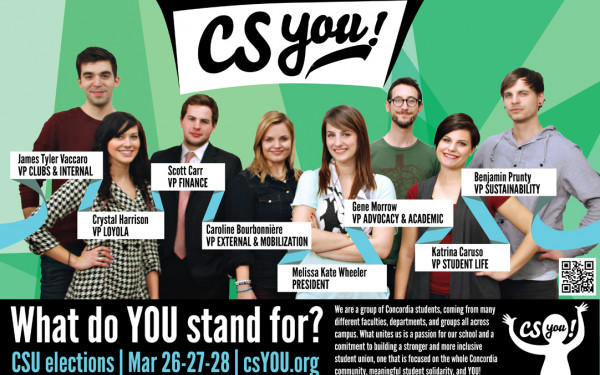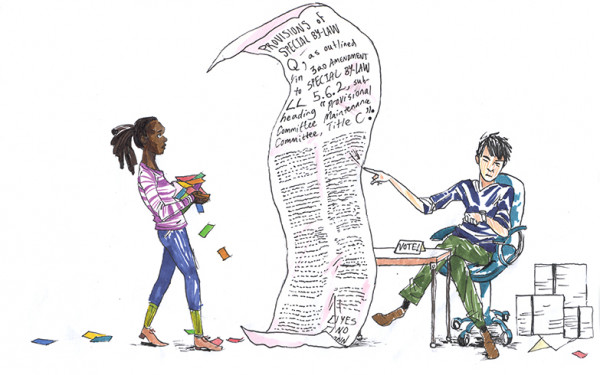CSU Removes Request Restrictions for Purchases Under $1,000
Policy Implemented in August Reversed by Council
The Concordia Student Union voted Oct. 9 to return preemptive spending authority to the union’s standing committee for purchases under $1,000 following a debate that saw tensions escalate amongst members of the executive.
“I feel micromanaged, I’d like a little more liberty, [the process] is very tedious,” VP External Caroline Bourbonnière told council.
The original motion, put forward by arts and science councillor Yasmeen Zahar, sought to empower the sustainability and external committees to administer spending for purchases under $10,000 falling under green initiatives, speaker series and campaigns budget lines, respectively.
“Speaking from just the SusCom’s experience we’re kind of having a bit of trouble with the restrictions that have been put on us,” said Zahar when motivating her motion before council.
New spending restrictions were imposed over the summer by the CSU’s financial committee, according to VP Finance Scott Carr and engineering and computer science councillor and FinCom member Chuck Wilson.
In an interview with The Link Wilson explained the changes were meant to ensure more responsible fiscal safeguards were in place.
“It was [before the Oct. 9 meeting] that for any money to be disbursed from these budget lines, there would have to be a proposal to go to FinCom, so that could be for an entire event, or ‘I’m requesting $700 for some newspaper subscriptions to stay up to date,’” he said.
“Not every little minor expense would have to go through FinCom, but for money to be allocated as money that could be spent [from committee budget lines], there had to be some sort of budget proposal that would go through FinCom.”
Both Bourbonnière and VP Sustainability Benjamin Prunty maintained during council deliberations that they were being hampered from effectively doling out funds to their respective committee’s projects, and also were not receiving all the money they had proposed.
The sustainability committee requested $3,000 to spend under the green initiatives budget line, but FinCom only approved $500.
“We thought that’s too much; we haven’t seen how you spend money. We’ve seen problems in the past so we’re allowing you to spend $500 to spend as you see fit and then get it refunded afterwards for emergency situations,” said Carr.
“At the end of the day the internal organization of events [is] really bad lately at the CSU; I’m going to be honest, [it’s] not up to par, and we need to start forcing [committees] to be up to par.”
—VP Finance Scott Carr
During the council meeting, Bourbonnière said that committees need the autonomy to fund last minute spending situations, which are sometimes unavoidable in organizing initiatives and events.
Offering an example, she noted that after months of coordination, noted linguist and philosopher Noam Chomsky had agreed to visit Concordia for an upcoming speaker series event Oct. 26, but that she only found out earlier that day.
Carr, who, during the deliberation, routinely found himself at odds with Bourbonière and Prunty along with members the external and sustainability committees, told council emergency spending could still be done and approved retroactively, and that the committees were receiving their budget requests in increments in an attempt to better rein in spending.
“We understand [instances of emergency funding] occur, the problem we’re seeing is the larger events that also aren’t passing through FinCom, that these things are just happening without us being able to take a look at it,” said Carr.
Prunty responded by indicating the Sustainable committee’s $3,000 proposal included multiple initiatives, which were documented in the request.
“We needed $3,000 [not] to spend on whatever, there were three different budget lines that this money was for, so it was grossly misrepresented when it was being presented [to council]. It was for contingency funds for sustainability groups,” he said.
The CSU also has the most money and resources among Concordia’s student infrastructure, Prunty continued, “and yet we are not capable of operating at a completely professional level.”
But Carr challenged that the oversight was necessary considering past financial mismanagement at the CSU.
”We don’t want to see things like Newtown happen, we don’t want to see events fail, and we want to make sure that those budgets are forced to be in in advance, because they’re not being [given] in [on time].
“At the end of the day the internal organization of events [is] really bad lately at the CSU; I’m going to be honest, [it’s] not up to par, and we need to start forcing [committees] to be up to par.”
In September, it was reported that members of last year’s CSU executive authorized the spending of over $9,000 for an end-of-semester banquet at Newtown bar on Crescent St.
CSU President Melissa Kate Wheeler was tasked by council to draft a letter to the VPs in question requesting they pay back the money and apologize publicly to students.
Questions of financial mismanagement also surrounded the allocation of an extra $19,100 towards ASFATalks 2013, a speaker series put on by the Arts and Science Federation of Associations in March with funding from the CSU.
Former CSU executives Simon-Pierre Lauzon and Keny Toto were asked by last year’s council to resign, though they were not mandated to do so and did not relinquish their portfolios until the end of their mandate.
Bourbonniere, who at the time was the president of ASFA, was also nearly impeached by her faculty association for her involvement.
Following the vote by council, standing committees will now have the authority to make purchases under $1,000 without having to submit a request to Carr or FinCom for the funding beforehand.
But in an interview with The Link Monday, Carr was quick to point out he still has the power to reject purchases retroactively, and whoever made the purchase will be responsible for paying the money back.
Arts and science councillor Wendy Kraus-Heitmann called the motion “sneaky” during deliberations, believing at the time it would remove financial power from Carr.
Wheeler did take issue with the descriptor, but prefaced her response by saying she felt the financial controls could be too restrictive, though her executive would respect the wishes of council whatever they may be.
“I’d just like to speak out on behalf of my team,” she said. “We’re not sneaky, my VPs are not sneaky, and this is not a sneaky initiative.”

2_900_600_90.jpg)



_600_375_90_s_c1.jpg)

